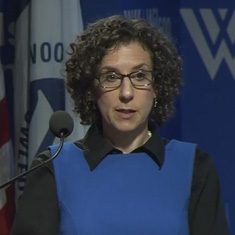-
Miriam Temin: Migrant Girls, Forced or Not, Need Safety Nets
July 26, 2013 By Swara Salih
“There’s a common myth that migrant girls are forced to move against their will, but in fact what we’ve found through our research is that most migrant girls are involved in the decision to move,” said the Population Council’s Miriam Temin in this week’s podcast.
Temin spoke at the launch of her and her colleagues’ new report, Girls on the Move: Adolescent Girls and Migration in the Developing World, about the economic incentives for girls to migrate and the risks involved for them.
“There’s a common myth that migrant girls are forced to move against their will, but in fact what we’ve found through our research is that most migrant girls are involved in the decision to move,” said the Population Council’s Miriam Temin in this week’s podcast.
Temin spoke at the launch of her and her colleagues’ new report, Girls on the Move: Adolescent Girls and Migration in the Developing World, about the economic incentives for girls to migrate and the risks involved for them.
The common myth is that girls and young women are forced to be on the move, either by their families or their communities, she said. However, some migrate by their own volition, often to earn income for their families back home. Temin explained that this voluntary tendency is usually caused by “adolescent girls internaliz[ing] family obligations, community obligations,” and “gender norms.”
Migration for girls exacerbates social isolation, she said: “It is a chilling fact that the most vulnerable adolescent girls have the fewest friends [and] the least access to social support through their families.”
The preface of the report says that without proper support, girls can become more and more isolated and more prone to abuse and economic exploitation. “Migrant girls need safety nets which help them gain access to social support, recognizing that they’re less likely to have it than others,” said Temin.
Download Temin’s slides to follow along.
Friday podcasts are also available for download from iTunes.
Topics: demography, development, economics, Friday Podcasts, gender, livelihoods, migration, podcast, population, urbanization, youth
 A Publication of the Stimson Center.
A Publication of the Stimson Center.



